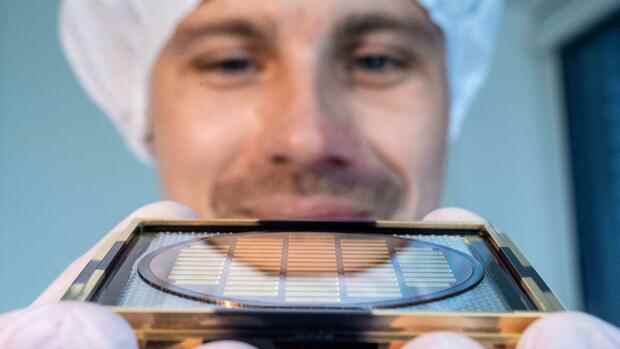A Q.ANT employee shows a wafer from which photonic chips are cut.
(Photo: TRUMPF GmbH + Co. KG)
Stuttgart If you want to know where Germany stands in terms of quantum technology at the upcoming Hanover Fair, you should take a look at the four-year-old start-up Q.ANT. The Trumpf subsidiary will be showing industrial customer applications for the world’s first quantum sensors there.
With their help, the size, shape and speed of the finest microparticles can be measured simultaneously for the first time. “Our quantum-based particle sensors enable new processes, applications and industrial products,” says Q.ANT founder Michael Förtsch.
Together with the sensor specialist Sick, Q.ANT is now presenting a quantum sensor that can be used to check the quality of coffee. The semiconductor measures the exact grain, which plays a crucial role in the different flavors of the coffee. The component is already being used by a large food manufacturer.
At the Hanover Fair, the control and automation specialist Festo is showing an algae reactor that, with the help of the Stuttgart quantum sensor, receives real-time information about the growth of the organisms inside the system.
Top jobs of the day
Find the best jobs now and
be notified by email.
In the new bioreactors, the efficiency of the algae in binding carbon dioxide is to be increased to a hundred times that of land plants. The resulting climate-neutral substances can be used for pharmaceuticals, packaging or cosmetics, among other things. Q.ANT is now entering into a strategic cooperation with Festo.
Photonic quantum chips do not need complex cooling
But the sensors are just the beginning. Q.ANT is already working on quantum chips. But why should a company, no matter how small, be able to do this when many large tech companies are working on quantum computers? Founder Förtsch relies on light for data transport. By applying highly specialized light channels to silicon chips, this so-called photonic chip process can be used to guide, control and monitor quanta with virtually no loss, even at room temperature.
>>Read here: Cellular: why Qualcomm operates a factory in the middle of Munich
Förtsch proudly shows a first prototype with the semiconductors stored in gel. Its chips need virtually no cooling like IBM’s quantum computer. This is a great advantage: It also enables the chips to be used in conventional mainframe computers. They should then enable previously unsolvable arithmetic operations with complex amounts of data, for example in the field of artificial intelligence. Q.ANT is leading a project funded with 50 million euros to build a facility for photonic quantum computer chips.
A Q.ANT engineer prepares a photonic chip for the next step.
(Photo: TRUMPF GmbH + Co. KG)
50 experts are working on this key topic in an industrial area in Stuttgart. “It’s important to work together like in a soccer team, where everyone knows where their opponents are going,” says Förtsch. At Q.ANT, it’s the ways of thinking. In any case, money alone does not seem to be the decisive factor in the quantum project either. Competitors in photonic quantum computing are the American Psiquantum and the Canadian Xanadu. Both have several hundred million dollars in venture capital from investors. But according to Förtsch not as far as the Stuttgart.
Trump is the sole investor
Q.ANT is the only investor with laser specialist Trumpf. It is the story of an early connection: During a company visit, Förtsch found it fascinating what Trumpf does with the industrial use of laser light, and later hired him. Technical director and Trumpf Vice Peter Leibinger secured the services of the photonics specialist as personal advisor in 2015.
During that time, Förtsch presented his ideas on photonics to the Trump technical director on two handwritten pages. “You have to start your own company,” Leibinger said, raising capital from the family business. The money will last until the end of the year, and the research funding has been added to that.
>>Read here: Chip competitor Rohm goes hunting Infineon on
Leibinger is one of the initiators of a roadmap with the aim of developing the first German quantum computer within five years. One of the reasons for the optimism is Förtsch with his start-up. The Trumpf Photonic Systems branch in Ulm is to manufacture the chips according to Förtsch’s specifications. Within two and a half years, Q.ANT intends to present the first industrially usable prototype, which should be ready for series production in five years. That would be groundbreaking, not just for Trumpf.
More: This is how Trumpf is campaigning for high-tech billions from the federal government
